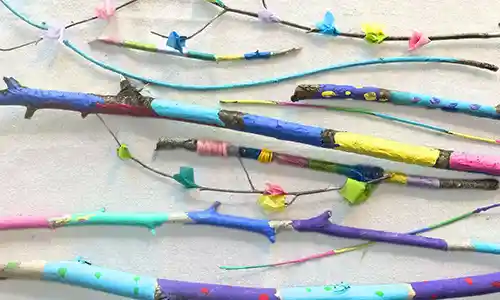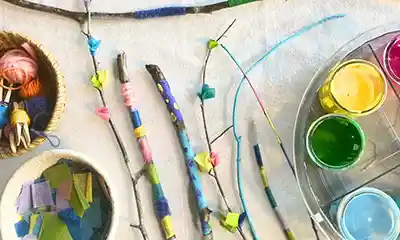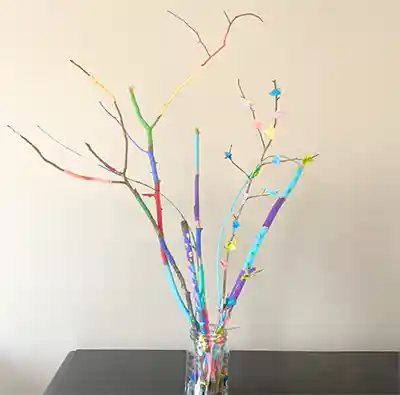Regular Price $19.99
Your Price $17.99
Bright & Beautiful Branches

This collaborative, nature-inspired art experience invites children to explore texture, color, and pattern as they transform real branches into bright, beautiful sculptures using everyday materials like paint, yarn, and tissue paper. This open-ended activity supports sensory exploration, fine motor skills, and community-building through shared creativity.
Ages/Grades
Toddler (with supervision & support)
Preschool
Early Elementary
Learning Domains
Sensory Exploration
Creative Arts
Fine Motor Development
Social-Emotional Development
Science & Nature
Language Development
Materials:
- • Clean, dry branches (collected outdoors or provided)
- • Washable tempera paint and brushes
- • Colored string or yarn
- • Tissue paper squares
- • Glue sticks or liquid glue
- • Small trays or mats for each child’s workspace
- • Beads, buttons, feathers (optional)
Preparation
- • Collect and clean branches in advance (or take children on a branch-collecting walk).
- • Pre-cut tissue squares and prepare materials in easily accessible bins or trays.
- • Cover tables or work surfaces for easy clean-up.

Ready, Set, Create!
![]() Invite children to choose a branch and explore its shape and texture.
Invite children to choose a branch and explore its shape and texture.
![]() Offer a variety of materials and let them decide how to decorate — painting, wrapping with yarn, gluing tissue paper, or layering all three!
Offer a variety of materials and let them decide how to decorate — painting, wrapping with yarn, gluing tissue paper, or layering all three!
![]() Encourage collaboration by letting children work side-by-side or contribute to a “community tree” displayed in your space.
Encourage collaboration by letting children work side-by-side or contribute to a “community tree” displayed in your space.
Engage Children in Conversation
- Invite children to describe their branch – how does it feel, what textures and colors do they notice? Compare and contrast to other branches in the collection.
- As children add materials to their branch, encourage them to describe their process.
- Do specific colors remind you of a particular season? Encourage children to describe their associations between colors and seasons.

Extensions
- After children have had an opportunity to create freely, invite children to try a pattern with their colors on their branch.
- Create a collaborative display by arranging all branches in a sturdy container or basket.
- Incorporate storytelling: “What might live in your branch?”
- Use as a launching point for a spring nature walk or observation journal.
Modifications
- For younger children, offer larger branches, remove any choking hazards, and provide close support.
- For children with sensory sensitivities, offer tools (e.g. clothespins or tweezers) for handling materials.
Suggested Products
Regular Price $37.54
Your Price $33.79
Regular Price $19.99
Your Price $17.99
Regular Price $2.77
Your Price $2.49
New
Regular Price $19.99
Your Price $17.99





